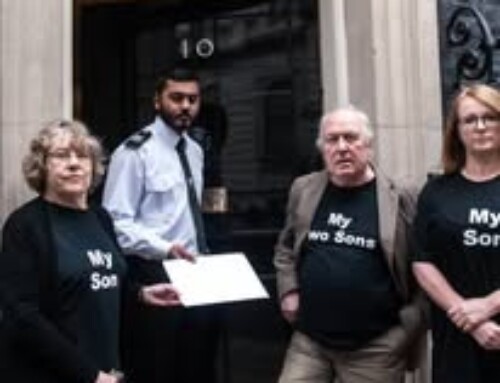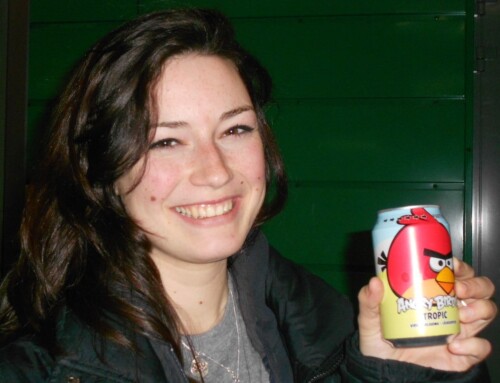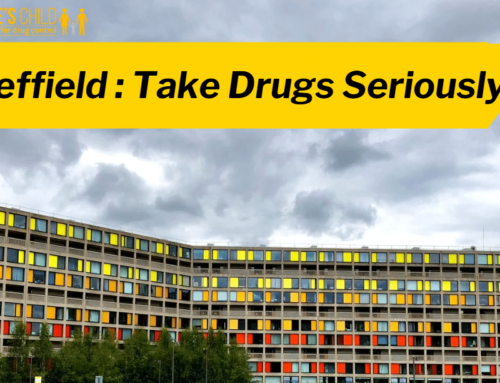An Anyone’s Child take on the characters in T2
Caution – contains spoilers!

This is a blog by Mary Ryder, coordinator of Anyone’s Child: Families for Safer Drugs Control
Trainspotting 2 is an emotional film, and a really gripping one. It is a harrowing depiction of 20 wasted years; the product of a vicious cycle of crime, violence and substance abuse, and the effect this has on close relationships. What T2 fails to do is seriously address addiction as the medical issue it is, and unfortunately, the film is a missed opportunity for much needed meaningful discussion about drug policy reform.
So let’s do that here. Let’s play ‘Trainspotting: what if drugs were legally regulated?’
T2 is a poignant depiction of why the current approach to drug policy is endangering society. No one doubts that drugs can be dangerous – both Trainspotting and T2 illustrate this – and that’s why we need our drug laws to keep people as safe as possible. Renton, Spud, Sick Boy and Tommy have each paid a huge price for policies hinged on prohibition and the consequences of an illegal, unregulated market.
Renton
Firstly consider Renton. T2 sees Renton return from Amsterdam, having spent 20 years trying to escape from his life in Edinburgh. Supposedly, he has channeled his drug addiction into running away and has swapped it with exercise. Nevertheless, he comes back drowned with baggage and guilt.
Because of prohibition, drug users are stigmatised and discriminated against which makes already vulnerable people suffer for political convenience. It’s clear that Renton’s parents found their son’s drug use difficult to understand and cope with. Consequently, they had not been able to engage with him successfully and their relationship has completely broken down. Rejection, depression and loneliness are evident in 46 year old Renton.
Reformed drug policy centred around honesty, compassion and health would have seen Renton’s addiction treated as a health issue and he would have been able to access proper support. Such laws might have salvaged his relationship with his parents and the past 20 years could have been spent enjoying their time together as a family.
Spud
Arguably the downward spiral of dependence is portrayed in Spud more clearly than any of the other characters. In T2 Spud is a suicidal heroin user, separated from his wife and son. But Spud is also a creative and witty writer with a special gift for storytelling, and despite the addiction, we see many glimpses of Spud’s gentleness and vulnerability. If current drug policy had been replaced by safer, more compassionate drug laws he may not have been made to feel so negative about himself and I believe his story would have been different.
Spud has spent the previous 20 years high on heroin. With no way of knowing the strength of heroin bought on the street, every single time he used he was putting his life at unnecessary risk. Under prohibition the purity of drugs is left in the hands of criminal gangs. Safer drug laws would see legally regulated drugs labelled with health warnings and dosage instructions – an incontestable improvement.
Having spent much of the film battling his addiction with a dutiful attempt at staying abstinent, at the end of the film Spud refuses to accept a large amount of money, saying that he will once again spend it all on smack. This resolute, self-deprecating statement illustrates the potentially crippling never-ending nature of addiction for many if they are left in an environment where they are criminalised, and the right support is simply not there. If drugs were legally regulated and users could get safe, unadulterated drugs, the best advice and compassionate treatment, maybe it would be different.
Sick Boy
20 years has seen Sick Boy, now Simon, swap heroin for cocaine and porn. He has not turned his life around, he has just swapped one addiction for another and continues to steal to fund his habit. It is deeply depressing to see how secretive and ashamed of his addiction he is, as Simon refused to acknowledge and talk about it even with his closest friends and girlfriend.
It is the illegality of his addiction that pushed Simon to the edge of society and left his friends helpless. If drugs were legally regulated he would also have been able to access proper support and medical care, to help address the problems underlying his dependence and come off drugs safely.
Tommy
Finally, Tommy died from HIV-related toxoplasmosis in the first film. This death was unnecessary and avoidable. He should still have been there with his friends ‘choosing life’. Unfortunately, without access to proper evidence-based treatment and public health measures the global ‘war on drugs’ drives the HIV/AIDS pandemic among people who use drugs and their sexual partners.
The real casualties of the drug war
T2 is just a film, but these ‘stories’ are real. There are real casualties of the drug war suffering every day in Scotland and around the world because of a failed policy. Current rhetoric maintains that drugs need to be illegal to protect our families. But this is not the case.
With drug-related deaths at a record high clearly we are paying too high a price in the – false – name of protecting individuals, families and communities from drugs. There is clearly urgent need to reform both attitudes and policy. Anyone’s Child is calling for the government to be honest and base UK drug policy on reality, not fear – and that means regulating drugs to reduce the risks they pose. Join the Anyone’s Child campaign for safer drug control and laws that protect families. The reality is that the lives of the characters and the plot for T2 would simply not be remotely possible if drugs were strictly legally regulated. And the world would be a better place for it.
Begbie
*It is only fair to briefly mention Begbie. Begbie, unlike the other characters, is a violent psychopath. It is unlikely that drug policy reform would change him very much. But our current approach hands the drug market to the criminals most willing to use violence and intimidation to win market share. So people like Begbie – the least likely to put the well-being of others first – prosper. Taking the trade away from the Begbies of this world, ending the ‘war on drugs’ and establishing effective and humane drug laws is no silver bullet for all of society’s problems, but is nevertheless an important step forward!




Absolutely spot on. Thanks for helping to dispel the stigma and for taking an honest approach to substance misuse/abuse, from a recovering addict of a 20 year heroin addiction.